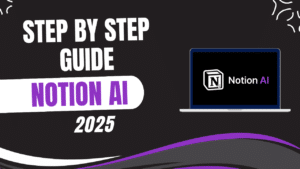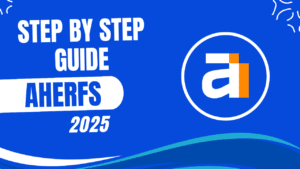GoDaddy vs Namecheap: Choosing the right domain registrar is crucial for your online presence. Two popular options are GoDaddy and Namecheap.
Namecheap emerges as the superior domain registrar in 2025, offering more affordable pricing, free WHOIS privacy protection, and a user-friendly interface that appeals to beginners and experienced users alike. GoDaddy provides more comprehensive additional services and better phone support but comes with significantly higher renewal prices and more aggressive upselling tactics.
Pricing Comparison
The pricing structure forms a critical differentiator between these two domain registrars. Namecheap consistently offers lower prices across most domain extensions, particularly for renewals. GoDaddy’s initial pricing may seem attractive with promotional offers, but their renewal rates increase substantially.
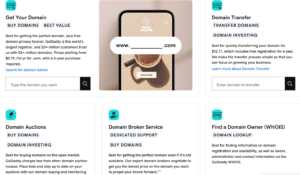
For domain registration, Namecheap charges between $10-15 per year for common TLDs like .COM, .ORG, and .NET, while premium domains like .IO and .AI range from $30-80 annually. GoDaddy’s promotional pricing can start extremely low (even $0.50 for .com domains), but renewal prices jump significantly, with .com domains renewing at $39.96.
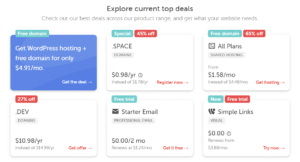
| Domain Extension | GoDaddy Registration | GoDaddy Renewal | Namecheap Registration | Namecheap Renewal |
|---|---|---|---|---|
| .com | $0.50 | $39.96 | $10-15 | Same price |
| .com.au | $0.01 | $23.95 | Varies | Same price |
| .net | $0.04 | $42.95 | $10-15 | Same price |
| .org | $34.95 | $39.95 | $10-15 | Same price |
| .info | $8.50 | $64.96 | Varies | Same price |
The pricing advantage extends to Namecheap’s hosting services as well. Namecheap offers shared hosting starting at just $1.58 per month with a two-year subscription, while GoDaddy’s plans begin at $6.99 per month. Namecheap allows monthly payments without significant price inflation, whereas GoDaddy requires a three-year commitment for the best rates.
The renewal pricing structure favors Namecheap significantly. When paying monthly, Namecheap maintains consistent pricing upon renewal. For annual payments, rates typically double after the first year but still remain lower than GoDaddy’s renewal prices, which increase by approximately 25%.
Features and Services
Both registrars offer comprehensive domain management services, but their feature sets differ in important ways. Namecheap supports over 1,500 TLDs, providing more options than GoDaddy’s selection. This extensive range gives users more flexibility in finding their ideal domain name.
Namecheap includes free WHOIS privacy protection with most domain registrations, a significant advantage for privacy-conscious users. GoDaddy now also offers free domain privacy with their registrations, a relatively recent change to their service offering.
The domain management interfaces differ substantially between the two providers. Namecheap’s control panel receives praise for its intuitive design and straightforward navigation. GoDaddy’s interface, while feature-rich, presents a steeper learning curve for new users.
Namecheap’s domain checker tool stands out as particularly impressive. The platform offers an advanced domain search tool with five options: domains, auctions, handshake, generator, and “beast mode.” The latter allows users to enter up to 5,000 domains or keywords, select price ranges, and choose from 1,196 TLDs organized by categories.
GoDaddy excels in additional services, offering a more comprehensive suite of tools for website building, email hosting, and digital marketing. Their ecosystem includes AI-powered website builders (Airo and Website Builder), WordPress hosting, virtual private servers, and Studio content creation tools.
| Feature | GoDaddy | Namecheap |
|---|---|---|
| TLDs Supported | 500+ | 1,500+ |
| WHOIS Privacy | Free | Free |
| Domain Checker | Standard | Advanced with 5 options |
| Website Builder | Included | Included |
| Email Hosting | From $0.99/month | Free |
| SSL Certificates | Paid add-on | From $5.99/year |
| Subdomains | Up to 100 | Multiple |
Performance and Reliability
Performance testing reveals interesting differences between the two providers. In speed tests, Namecheap demonstrates faster loading times in key metrics like Largest Contentful Paint (LCP) and Speed Index. Namecheap’s LCP measured at 1.188 seconds and Speed Index at 1.103 seconds, compared to GoDaddy’s 1.417 seconds and 2.735 seconds respectively.
GoDaddy, however, shows slightly better Time to First Byte (TTFB) at 0.369 seconds versus Namecheap’s 0.404 seconds. This indicates that GoDaddy’s initial server response is quicker, but Namecheap provides a faster overall user experience.
In stress testing with 50 Virtual Users over 5 minutes, both providers handle increased traffic admirably with no HTTP failures. GoDaddy demonstrates superior performance under load, with a 95th percentile response time of just 70 milliseconds compared to Namecheap’s 319 milliseconds. This suggests GoDaddy’s infrastructure may be better equipped to handle traffic spikes.
Uptime guarantees differ slightly between the providers. Namecheap offers a 100% uptime guarantee for their hosting services, though actual performance has been measured at 99.82% in some tests. GoDaddy provides a 99.9% uptime guarantee, which they generally meet or exceed.
Storage allocations also differ, with GoDaddy offering 25 GB of NVMe storage on their basic plan compared to Namecheap’s 20 GB of standard SSD storage. This gives GoDaddy a slight edge in storage performance and capacity.
User Experience and Ease of Use
The user experience differs significantly between these two domain registrars. Namecheap prioritizes simplicity and straightforward navigation. The company’s control panel uses a basic cPanel version that, while lacking a custom skin, remains intuitive and functional. This approach makes Namecheap particularly accessible for beginners.
GoDaddy’s interface offers more features but presents a more complex experience. The learning curve can be steeper for new users, though the additional functionality may benefit experienced website owners or those with more complex needs.

Domain management processes also differ between the providers. Namecheap makes it easy to search for and register domains with their advanced domain checker tool. The platform also simplifies domain transfers, making it straightforward to move domains from other registrars.
GoDaddy’s domain management system offers robust features but can feel overwhelming to navigate. The company’s tendency to upsell additional services during the registration and management processes can also create a less streamlined experience.
Website building tools are available from both providers. Namecheap’s website builder receives praise for its intuitive design, though some users note it can be somewhat restrictive. GoDaddy’s AI-powered Airo builder, which comes with every domain, allows users to publish a site in as little as two minutes.
Security Features
Security offerings form another point of differentiation between these domain registrars. Namecheap includes several security features in their basic packages. The company provides free SSL certificates, DDoS protection, and domain privacy with their plans.
Backup policies vary between the providers. Namecheap offers twice-weekly backups with their Stellar Plus and Stellar Business hosting plans, though the basic Stellar plan does not guarantee backups. GoDaddy provides daily backups with their Business hosting plan.
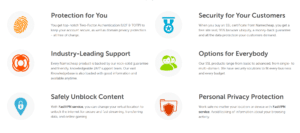
Both registrars offer DNSSEC (Domain Name System Security Extensions) as a standard feature. This technology adds an extra layer of security to prevent DNS spoofing and cache poisoning attacks. Namecheap also offers a premium DNS service that provides enhanced security and a 100% uptime guarantee.
SSL certificate options differ between the providers. Namecheap offers SSL certificates starting at $5.99 per year, with options suitable for websites of all sizes. GoDaddy includes a free SSL certificate for one year with their Economy hosting plan, after which it becomes a paid add-on.
| Security Feature | GoDaddy | Namecheap |
|---|---|---|
| WHOIS Privacy | Free | Free |
| SSL Certificates | Free for 1st year (Economy plan) | From $5.99/year |
| DNSSEC | Included | Included |
| DDoS Protection | Basic | Included |
| Backups | Daily (Business plan) | Twice weekly (higher plans) |
| Premium DNS | Available as add-on | From $4.88/year |
Customer Support
Customer support represents a significant difference between these domain registrars. GoDaddy offers more comprehensive support options, including 24/7 phone support in 35 countries, live chat, and email assistance. This multi-channel approach provides users with more ways to get help when needed.
Namecheap does not offer phone support, relying instead on 24/7 live chat and a ticketing system. Despite this limitation, Namecheap’s support receives high marks for responsiveness and effectiveness. Support representatives typically respond to email inquiries within 24 hours.
Both companies provide extensive knowledge bases and tutorial resources. Namecheap’s resource center receives particular praise for its comprehensive coverage of topics related to domains, hosting, and website management. These self-help resources can address many common questions without requiring direct support intervention.
Wait times differ between the providers. GoDaddy’s support can have wait times of up to 20 minutes during busy periods. Namecheap’s live chat support generally offers faster response times, though this can vary depending on demand.
The quality of support also differs in user experiences. Namecheap’s support team receives consistent praise for their knowledge and helpfulness. GoDaddy’s support quality can be more variable, with some users reporting excellent experiences and others noting less satisfactory interactions.
Additional Services
Both registrars offer a range of additional services beyond domain registration. GoDaddy provides a more extensive ecosystem of products, including website builders, email hosting, virtual private servers, and marketing tools. This makes GoDaddy a potential one-stop shop for all website-related needs.
Namecheap offers a more focused set of additional services, including web hosting, SSL certificates, email hosting, and a website builder. While less extensive than GoDaddy’s offerings, these services cover the essential needs of most website owners.
Email hosting represents a notable difference. Namecheap includes free email hosting with domain registrations, while GoDaddy charges from $0.99 per month for this service. This adds to Namecheap’s cost advantage for users who need domain-based email addresses.
Website building tools differ between the providers. GoDaddy’s AI-powered Airo builder and traditional Website Builder offer more advanced features. Namecheap’s website builder is more basic but still provides the essential functionality needed to create a professional-looking site.
Namecheap offers handshake domains, which are new TLDs based on a decentralized blockchain system. Examples include extensions like .1, .C, .API, and .SAAS. While these domains are not yet compatible with most traditional DNS systems, they represent an innovative offering not available through GoDaddy.
My Opinion
After analyzing both domain registrars extensively, Namecheap emerges as the better overall choice for most users in 2025. The company’s combination of affordable pricing, user-friendly interface, and comprehensive feature set makes it particularly appealing for individuals, small businesses, and those new to domain registration and website management.
Namecheap’s pricing structure represents its most significant advantage. The consistently lower prices, particularly for renewals, provide substantial savings over time compared to GoDaddy. The inclusion of free WHOIS privacy protection and email hosting further enhances this value proposition.
The user experience with Namecheap feels more straightforward and less cluttered by upselling attempts. This creates a more pleasant registration and management process, especially for those who may feel overwhelmed by too many options or add-on offers.
GoDaddy does excel in certain areas that may make it the preferred choice for specific users. Their more extensive ecosystem of additional services creates a convenient one-stop solution for those who want everything under one roof. The availability of phone support also provides an additional support channel that some users may prefer.
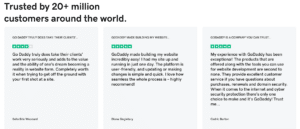
For businesses with higher traffic websites or those expecting significant growth, GoDaddy’s superior performance under load may be a deciding factor. Their slightly better uptime and faster response times under stress could be crucial for commercial websites where every second of downtime has financial implications.
However, for the majority of users—from individuals registering their first domain to small businesses establishing an online presence—Namecheap provides the better overall value. The combination of lower prices, user-friendly interface, and essential features creates a compelling package that’s difficult to beat.
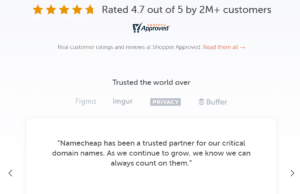
Conclusion
In the competitive landscape of domain registrars in 2025, both Namecheap and GoDaddy offer robust services with distinct advantages. Your choice between these providers should align with your specific needs, budget constraints, and technical expertise.
Namecheap stands out as the better value for most users, particularly those prioritizing affordability and simplicity. The company offers lower prices across most domain extensions, free WHOIS privacy protection, and a user-friendly interface that makes domain management accessible even to beginners. Their advanced domain search tools and free email hosting further enhance this value proposition.
GoDaddy remains a strong contender, especially for users who value comprehensive additional services and phone support. Their ecosystem of website building, hosting, and marketing tools creates a convenient all-in-one solution. Their superior performance under high traffic conditions also makes them suitable for growing businesses with higher-traffic websites.
For budget-conscious users, small businesses, and those new to domain registration, Namecheap represents the better choice in most scenarios. The significant savings on renewal prices alone can make a substantial difference over time, especially for those managing multiple domains.
For businesses seeking an integrated solution with more advanced features and willing to pay a premium for them, GoDaddy offers advantages that may justify the higher cost. Their phone support and slightly better performance metrics under load could be deciding factors for commercial websites where reliability is paramount.
Ultimately, both registrars have earned their positions as industry leaders by providing reliable services that meet the needs of millions of users worldwide. Your specific requirements and priorities will determine which represents the better choice for your domain registration needs in 2025.
FAQ
Q: Which domain registrar offers better pricing in 2025, GoDaddy or Namecheap?
A: Namecheap offers significantly better pricing in 2025, especially for renewals. While GoDaddy may have attractive promotional pricing for first-time registrations (as low as $0.50 for some domains), their renewal rates are much higher (around $39.96 for .com domains). Namecheap maintains more consistent pricing between initial registration and renewals, making it more economical in the long run.
Q: Does GoDaddy or Namecheap include free WHOIS privacy protection?
A: Both GoDaddy and Namecheap now include free WHOIS privacy protection with domain registrations in 2025. This represents a change for GoDaddy, which previously charged for this service. This privacy feature helps protect your personal information from being publicly accessible in domain registration records.
Q: Which registrar has better customer support?
A: GoDaddy offers more comprehensive support options, including 24/7 phone support in 35 countries, live chat, and email assistance. Namecheap does not provide phone support but offers 24/7 live chat and a ticketing system. Many users report that Namecheap’s support team is more knowledgeable and responsive, despite having fewer contact channels.
Q: Can I transfer my domain from GoDaddy to Namecheap or vice versa?
A: Yes, you can transfer domains between these registrars. Both GoDaddy and Namecheap support domain transfers, though the process requires that your domain be unlocked and that you have the authorization code (EPP code) from your current registrar. Namecheap is generally considered to have a more straightforward transfer process and often offers promotional pricing for transfers.
Q: Which registrar is better for beginners?
A: Namecheap is generally considered more beginner-friendly due to its more intuitive interface, straightforward pricing structure, and less aggressive upselling. GoDaddy offers more features but presents a steeper learning curve and more complex navigation, which can be overwhelming for those new to domain registration and website management.
Q: Do GoDaddy and Namecheap offer website building tools?
A: Yes, both registrars provide website building tools. GoDaddy offers more advanced options, including their AI-powered Airo builder and traditional Website Builder with extensive templates and features. Namecheap’s website builder is more basic but still functional for creating professional-looking sites. GoDaddy’s tools are generally considered more feature-rich but may require a higher learning curve.
Q: Which registrar performs better for high-traffic websites?
A: GoDaddy demonstrates superior performance under high traffic loads. In stress testing with 50 Virtual Users over 5 minutes, GoDaddy showed a 95th percentile response time of just 70 milliseconds compared to Namecheap’s 319 milliseconds. This makes GoDaddy potentially better suited for websites expecting significant traffic or rapid growth.
Q: Does either registrar include free email hosting with domain registration?
A: Namecheap includes free email hosting with domain registrations, while GoDaddy charges from $0.99 per month for this service. This represents another cost advantage for Namecheap users who need domain-based email addresses without wanting to pay additional fees.
Q: Which registrar offers better security features?
A: Both registrars provide essential security features, but their offerings differ. Namecheap includes DDoS protection and offers SSL certificates starting at $5.99 per year. GoDaddy includes a free SSL certificate for one year with their Economy hosting plan but charges for renewals. Both offer DNSSEC as a standard feature, with Namecheap also providing a premium DNS service for enhanced security.
Q: Can I register unusual or international domain extensions with these registrars?
A: Namecheap supports over 1,500 TLDs compared to GoDaddy’s 500+, giving Namecheap an advantage for unusual or international domain extensions. Namecheap also offers innovative “handshake domains” based on a decentralized blockchain system, though these are not yet widely compatible with traditional DNS systems.





